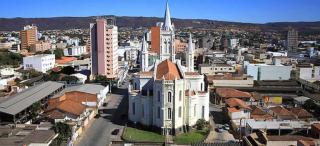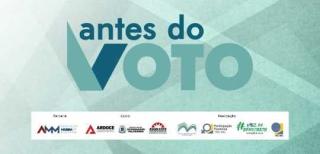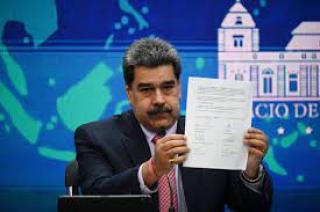Veja Também -
 Pessoas com TEA têm direito à cotas em concursos públicos
Pessoas com TEA têm direito à cotas em concursos públicos Governo de Minas fortalece o uso da linguagem simples
Governo de Minas fortalece o uso da linguagem simples Prefeitura de Montes Claros lança plataforma para emitir alvarás e agilizar construções na cidade
Prefeitura de Montes Claros lança plataforma para emitir alvarás e agilizar construções na cidade Minas Gerais entrega Medalha da Inconfidência a 171 personalidades e instituições
Minas Gerais entrega Medalha da Inconfidência a 171 personalidades e instituições Projeto 'Antes do Voto 2024' chega a Governador Valadares, Montes Claros e Uberlândia
Projeto 'Antes do Voto 2024' chega a Governador Valadares, Montes Claros e Uberlândia- Veja + Revelia News
Revelia News
Postado dia 30/12/2022 às 17:28:14
Will the World Ditch Its Punitive Approach to Venezuela in 2023?

As Maduro nears a decade in power, Washington and South American countries may try something new.
The Next Cuba?
In 2023, as in previous years, Venezuela’s problems will be much of the rest of the Western Hemisphere’s, too.
By March, Socialist Venezuelan President Nicolás Maduro will have been in power for a decade. His poor economic management combined with an aggressive U.S. sanctions campaign have fueled a crisis from which more than 7 million people have fled since 2015. Venezuelans are among the record numbers of migrants who have arrived at the U.S. southern border in recent months.
Meanwhile, Venezuelan organized crime groups have spread as far south as Chile. And Venezuelan security forces are reportedly cooperating with guerrillas from Colombia’s National Liberation Army (ELN) who operate across the two countries’ shared border. Venezuela’s government could thus choose to act as a spoiler in the Colombian government’s demobilization talks with the ELN, which is the largest remaining rebel group in the country.
Internationally mediated talks between the Venezuelan government and members of the country’s opposition have floundered at least five times over the past decade, most recently in 2021. The latest round of talks is scheduled to move forward in the coming months—this time, in Mexico City.
A best-case scenario for Venezuela’s opposition would include securing guarantees for competitive national elections in 2024 from Maduro; these could come in exchange for international sanctions relief on Maduro’s government and the country’s oil sector. A 2019 attempt to dislodge Maduro by withdrawing his diplomatic recognition was widely backed in the United States, Europe, and South America, but Maduro hung on to power—in large part because rumors of possible defection by military loyalists did not come to pass. In the years since, Maduro’s escalating political repression against members of the opposition has fed further U.S. sanctions.
But in recent months, the United States, some European countries, and several of Venezuela’s important South American neighbors have changed their tune toward Caracas, suggesting less of a focus on forcing regime change and more on dialogue. Even if Maduro stays in power, this shift means some of the secondary effects of Venezuela’s crisis—such as the outflow of migrants and organized crime—could be addressed via diplomacy.
Perhaps the most consequential change has come from Washington. After Russia invaded Ukraine in February, Western sanctions on Russian oil prompted a global scramble for replacement supplies. Venezuela has the world’s largest oil reserves, and experts estimate that removing U.S. sanctions on Venezuela’s oil sector could increase its production to more than 1 million barrels per day within two to three years.
In March, Biden administration envoys traveled to Caracas to urge Maduro to return to talks in exchange for potential sanctions relief; in response to the resumption of the Mexico City negotiations in November, Washington removed sanctions that had blocked Chevron from exporting Venezuelan oil. European countries have reengaged, too, with Spain this week reinstituting an ambassador to Venezuela for the first time in two years.
Newly elected leftist leaders of some of South America’s largest economies, such as Chile and Colombia, also say they support the negotiations and have openly called for democracy in Venezuela. Brazil’s incoming foreign minister said President-elect Luiz Inácio Lula da Silva would join the talks if invited. These moves are significant, as Maduro had previously escaped censure from many left-wing leaders in the region thanks to ideological affinities.
For all those reasons—as well as careful advocacy from Venezuela’s civil society and opposition—the Mexico City talks carry potential. Regardless of their outcome for the 2024 elections, renewed international attention to Venezuela’s crisis could have other important effects.
First, when left-wing leaders in the region call out Maduro’s anti-democratic behavior, it becomes harder to defend power grabs by other ideologically similar politicians. A case in point is the ongoing political crisis in Peru. The turmoil began when former left-wing President Pedro Castillo closed Congress in December in an effective attempt at a self-coup. While Colombian President Gustavo Petro defended Castillo, Lula and Chilean President Gabriel Boric did not—suggesting they would not necessarily give ideological comrades a free pass to descend into authoritarianism.
Second, a focus on Venezuela could yield financial resources urgently needed to respond to its migration crisis. Around 200 nongovernmental organizations across the region worked together with the United Nations to craft a regional plan to respond to Venezuela’s migration flows in 2022 but have only received donations to meet a quarter of its total $1.79 billion cost. The group released a similar appeal for 2023.
Finally, the fact that Washington has considered lifting sanctions on Venezuela may spur wider reflections on the purpose and effectiveness of the U.S. sanctions regime more broadly. In the Guardian in June, former New York Times reporter William Neuman wrote that the Trump administration drew up the idea for restrictions on Venezuela’s oil sector as the “ultimate sanction” for use only when it appeared that Maduro’s fall was imminent, due to the level of pain those sanctions would cause everyday Venezuelans. But the sanctions enacted in 2019 remain today, Maduro sits firmly in power, and Venezuela’s economic misery has sent millions of people fleeing north.
Neuman argued that easing U.S. sanctions on Venezuela could return economic growth to the country. As the case of Cuba shows, 60 years of sanctions can fail to deliver regime change—and spur outward migration instead.




